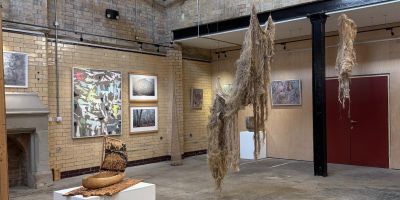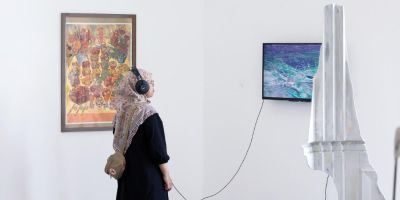Curating and exhibiting visual culture in times of coronavirus

A new Sadler Seminar Series considers the challenges and opportunities presented by lockdown/post-lockdown for curation and exhibition of visual art, both in the UK and abroad.
This interdisciplinary scoping project brings together scholars from the University of Leeds working in Film Studies, Digital Humanities, Cultural Studies, Media and Communication, Fine Art, and Museum and Gallery Studies, along with academics and arts-related partners in the UK and Brazil working in art curation, exhibition, film and video archives.
Funded by the Leeds Arts and Humanities Research Institute, the series is convened by Gill Park (School of Fine Art, History of Art and Cultural Studies), Stephanie Dennison and Thea Pitman (School of Languages, Cultures and Societies) and Simon Popple (School of Media and Communication).
A significant feature of the project is to broker new research relationships both between colleagues in the University of Leeds and with external stakeholders.
There is currently much discussion about the impact of COVID-19 isolation measures on the physical spaces where we experience visual culture (for example, cinemas, art galleries). The extent to which governments are providing support for both the physical spaces, the exhibits and the staff who run the sites varies considerably.
Many galleries and museums are seeking to mitigate closures with the impromptu curation of online exhibitions and live-streamed guided tours of their collections. Increasing numbers of films made for theatrical exhibition are now being screened and viewed online, often in partnership with film theatres.
The boundaries of curation are being further stretched by a range of ad-hoc social-media initiatives such as the seemingly never-ending film lists being produced by housebound filmmakers.
Rather than viewing this shift in the exhibition of visual culture from the material to the digital world in ‘isolation’ (pardon the pun), the series convenors propose to contextualise it within ongoing advances in technology and new media, a context that has been theorised since at least the turn of the new millennium.
The impact (if any) that this shift is having on the promotion of and access to artworks produced by women and ethnic minorities will be examined.
Brazil adds an interesting comparative dimension to these discussions, given that much work has been carried out recently in terms of ‘democratising’ the access to culture, and with regard to questioning the so-called lugar de fala, or who has the right to speak for whom when it comes to artistic representation.
Project activities will include online seminars and webinars on themes such as moving image installations, curating black diaspora films and indigenous art creation. A symposium on New Media Art is planned for the spring of 2021.
Dr Gill Park, Lecturer in Art Gallery, Museum & Heritage Studies, said:
‘This series presents a great opportunity to work with colleagues invested in film and visual culture from across our faculty, in order to explore a live issue: the impact of the current pandemic on the curation, presentation and distribution of visual art and cinema.
“We look forward to exploring practices close to home as well as learning from curators and academics in other parts of the world.”
More information, including a timeline of activities, can be found here.
Image
National Gallery of Art closed by washingtonydc. Licensed under CC BY-NC-SA 2.0.




